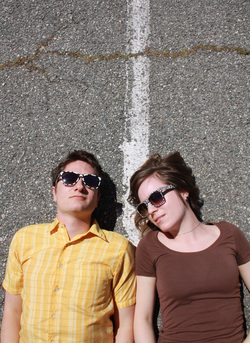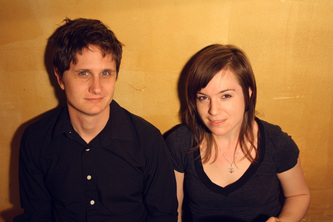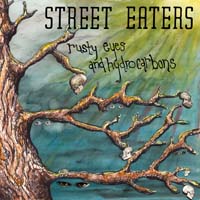by Wade Millward
“It’s ‘No’ right now,” says John. “I’ve narrowed it down to one word names now. Before, I went by things like Johnny NotJodieFoster Foster and Tom Araya FromSlayer. My name is much simpler these days. I’ve narrowed it down to keep it more focused and concise—even though it changes every six months.”
“You are such a moody guy,” teases March.
“I like the idea of constantly reinventing yourself,” he says.
Moodiness and spontaneity are what Street Eaters are all about: message-laden, politically charged melodic punk. The band is not afraid to share their beliefs.
“We draw inspiration from political and personal,” says No. “We’re avid readers and observers of things that happen on micro and macro scales. We care about what’s happening in the world, we take interest in the treatment of women and minorities. Taking a global view is part of being conscious. Our songs aren’t political in terms of advocating a specific bill, but we’ve been surrounded by war—”
“Oil spills,” March adds, “you see how the world is impacted, and it’s hard not to let it infiltrate your mind and compare the world around you.”
“We’re interested in framing,” he says. “Exploring a subject set in context of the modern world. Framing is paramount to interpretation.”
“Yeah,” she says. “For example, we have a song about women’s rights. I felt compelled to write it, to express myself through art and say what I have to say. People have told me the song was important; it was good to hear someone talking about it.”
“To be straightforward,” says No, “we’re living in the US in the 21st century, and the country is wealthy but home to profound injustices. It’s a deteriorating empire, and people need to write about the hard stuff.”
“There’s already enough escapist art,” says March.
“How many people in this country can’t afford health care, including me,” he says. “We write about sexuality—“
“Women in the workforce—”
“Toxic fumes. We could go on forever, you get the point.”
“But I don’t mean techno,” No jokes.
“It’s more grunge,” says March.
“It communicates what we do as a band,” he says.
Compared to their energetic live persona, Street Eaters’ recording method is quite meticulous.
“The irony of a studio recording is that bands want to go in and bang it out,” says No, “but we spend more time recording to bring out things to make our sound.”
“We record different batches of songs at different times,” March says. “We’ll record five songs in three hours; we don’t take much time to actually record, but we leave time between recordings.”
“For this album,” he says, “we listened to the songs to make sure they’re up to our stature, then picked the best recordings. We like to record songs when we’ve got them tight, but they’re still new. Then we put it all together, and make sure it makes sense as a cohesive whole.”
Even with the band’s precision in the studio, they acknowledge the road as their true calling.
“Live is better,” says March. “Making music in a studio is so final—playing live you have to make those quick decisions. It’s just a different way of making art. When you put out records, you get the artwork and the lyrics, and it’s a neat way of archiving things. Our struggle is to convey our live performance through vinyl.”
“Our sound is big and powerful,” says No. “That sense of community and catharsis comes across, especially on the new record.”
Street Eaters have been touring the country throughout June and July to support the album and deliver their message.
“Playing live is the fun part,” says March. “We’re community-oriented, so we go to towns where we know people so we can see friends. And we’ll go to new towns to meet new people.”
“We’re about serious, cathartic music and community,” says No. “The community aspect is when we play in smaller places, we like to talk to the audience and pass out lyric sheets before a performance. That’s really something bands don’t do anymore. We want people to understand what we’re talking about. It’s also about leaving a piece of the band behind.”
“It’s neat to play live because you get to let go and let your songs take life,” she says.
“You let the songs breathe,” he says. “We were brought up in the DIY touring culture, so we understand how important a big, good tour can be. Differentiating between making music from playing live is not in our genes.”
“We’ll actually need a house-sitter this time,” jokes March.
In a typical Street Eaters show, audiences are treated to a more intimate experience than one would expect from a punk band.
“We usually talk in between songs, to explain what they’re about,” says March. “Sometimes we play without stopping. It’s very intense and cathartic; the songs are about issues we care about. I have to play the drums while I sing, so performing for me uses the whole body.”
“We lose ourselves in the music once we reach a point where we can let loose and come alive,” says No.
“It also depends on the audience,” she says, “their energy and what they’re giving us.”
“What we’re saying in our songs is serious,” he says, “but even with the heavy subject matter the audience experiences this euphoria. Our melody is counterbalanced by the lyrics and high energy. It’s a way we express ourselves.”
Being able to wholly express messages may seem like a challenge for a band with only two members, but Street Eaters have overcome such suspicion.
“People will assume that a two-piece sounds less sonically full,” says No, “but we manage to quash that problem with multiple amps, interesting drums, our vocal harmonies.”
No and March have both experienced touring with larger bands, and they say that being a two-piece comes with its perks. Scheduling and transportation are much easier, and the group dynamic is simpler.
“With just two, decisions are made quicker,” says March, laughing. “With other bands there’s always a consensus. But that constant struggle can be exciting, to have personalities clash.”
“That we need to make minimal compromises is a huge plus,” adds No. “We sound how we wanted to from the beginning.”
But for two people so dedicated to the DIY lifestyle—which includes doing their own silk-screening and creating their own posters—being a duo has its annoyances.
“We only get two guest list spots,” says No.
“Merch production is a hassle,” adds March. “Since there’s only two of us and we do everything ourselves. Friends help out, but also there’s just the two of us to make sure everything gets done.”
“But the art is uncompromised,” he says. “It’s not watered down by five different views. March handles the artwork, I handle the outlook. We like these roles, but that means there’s less division of labor. But I’ve been in bands where only two people did most of the work anyway.”
“Gilman Street is 25-years-old,” says No. “It’s an all-ages, volunteer-run collective space. It follows a Marxist philosophy, and no one gets paid.”
“It’s to provide a safe space,” says March. “It’s a punk club that doesn’t allow homophobia, sexism, or racism. The volunteers have meetings. It’s an amazing place, a place where people get into punk.”
March and No constantly express their gratitude to Gilman, whose shows converted them to life-long punk devotees. No was enamored with hardcore and noise rock acts, like Scratch Acid and Butthole Surfers.
“I was too young to go to big shows, so I went to Gilman to watch,” says No. “One of my favorite shows was Tilt at Gilman, and I was stoked at seeing Karp. My mind was blown.”
March’s Gilman experience, on the other hand, was more personal. She says that she would follow her older sister to the venue, where she was inspired by a new wave of West Coast women punk rockers, with female-fronted groups like The Need and Bikini Kill.
“Those local lady bands were a powerful influence on a young teen,” says March. “And groups from all over the place would come through.”
“Not many girls at the age of ten saw 7 Year Bitch,” says No.
“It was a strange, unique experience for me,” she says. “The 90s for me were probably different from most.”
“Our song Heavy into Nothing,” explains March, “is about how, with the internet, we’re staring at screens, and people impart information through a tube, and how audiences are told how they should think. You lose the communication. With our art and personal experiences, we take that and put it in our shows. No communication between the audience and the band is a loss, and so we use our lyric sheets to open a dialogue.”
“They’re more immediate,” says No.
“They’re a way of taking something with you,” she says. “I still have lyric sheets from 90s shows that I saw. There’s also artwork on the lyrics sheets. I would say that they bring back communication between an audience and the band.”
“They were immediate and tight-knit,” he says. “Their community wasn’t spread out and global with the internet. And because music is instantaneous and so democratized today, it could be alienating.”
No and March are no Luddites, however. They acknowledge how the internet has made their strict DIY ethos possible in the 21st century.
“The internet can be used for positive communication,” says No. “It just depends on how you use it.”
“DIY tours can be alienating because you leave your home,” says March. “But you go out and talk to people; that’s community, that’s the DIY attitude. And computers have been good.”
“Facebook is a lot easier to work with than a payphone,” he says.
“Before if they booked a show, we had to mail in a demo,” she says, “and maybe they’d call you and then your parents would answer the phone. It is so much easier now.”
No laughs at this and mentions a “club owner in North Dakota calling a 16-year-old girl.” March then tells the story of her first tour, when she was 18 years old. At the time she was volunteering at the Gilman.
“My first tour was a disaster,” says March. “The whole thing was booked by payphone. It was exciting and an adventure, but it’s better now since communication is easier. It was cool to show up in a town and play with any group, regardless of their genre. It was cool because we got to meet different people, but now they just go to your Facebook page and categorize you.”
While Street Eaters may be easy to categorize, their spirited manner, political edge and DIY dedication brings back the bite that made punk in the 90s fun but meaningful.





 RSS Feed
RSS Feed